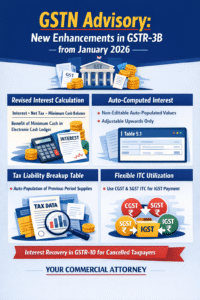Introduction
The Central Board of Indirect Taxes and Customs (CBIC) has issued Circular No. 244/01/2025-GST, dated January 28, 2025, to clarify and regularize the Goods and Services Tax (GST) treatment for certain insurance-related transactions. Based on the recommendations of the 53rd GST Council meeting held on June 22, 2024, in New Delhi, this circular addresses two key areas: co-insurance premium apportionment and reinsurance commission deductions.
The amendments provide much-needed clarity and consistency for the insurance industry. Below, we outline the major points discussed in the circular.
1. GST Treatment for Co-Insurance Premium Apportionment
In co-insurance agreements, multiple insurers jointly provide insurance coverage to the insured. The lead insurer collects the premium from the insured and apportions a portion of it to the co-insurers.
Key Clarifications:
- The apportionment of the co-insurance premium by the lead insurer to the co-insurer is now treated as an activity that is neither a supply of goods nor a supply of services under Schedule III of the CGST Act, 2017.
- This is applicable only when the lead insurer pays the applicable GST (Central Tax, State Tax, Union Territory Tax, and Integrated Tax) on the entire premium amount received from the insured.
This clarification removes ambiguity regarding the GST treatment of co-insurance arrangements and simplifies compliance for insurers.
2. GST on Reinsurance Commission Deductions
In reinsurance arrangements, insurers cede a portion of their risk to reinsurers and pay reinsurance premiums. Often, reinsurers deduct a “ceding commission” or “reinsurance commission” from the gross premium paid by the insurer.
Key Clarifications:
- The ceding or reinsurance commission deducted by the reinsurer is also treated as an activity that is neither a supply of goods nor a supply of services under Schedule III of the CGST Act, 2017.
- This treatment applies only if the reinsurer pays GST on the gross reinsurance premium (inclusive of the commission amount) received from the insurer.
This clarification ensures proper tax compliance without creating additional tax burdens on insurers and reinsurers.
3. Retrospective Regularization of GST Payments
The above provisions were introduced through the Finance (No. 2) Act, 2024, and came into effect on November 1, 2024, via Notification No. 17/2024-Central Tax, dated September 27, 2024.
To address past compliance issues, the GST Council recommended the regularization of GST payments for the period from July 1, 2017, to October 31, 2024. This regularization is done on an ‘as is where is’ basis, ensuring that businesses do not face penalties or disputes for previous transactions conducted before the amendments came into force.
4. Implications for the Insurance Industry
These clarifications and amendments bring significant benefits to the insurance and reinsurance sectors:
- Clarity in Tax Treatment: By defining these activities as neither a supply of goods nor services, compliance becomes simpler and disputes are minimized.
- Retrospective Regularization: Insurers and reinsurers can now regularize their GST payments for past transactions without fear of penalties.
- Simplified Compliance: The amendments align GST rules with the operational realities of the insurance industry, reducing administrative burdens.
Conclusion
Circular No. 244/01/2025-GST is a positive step towards simplifying GST compliance for insurers and reinsurers. By clarifying the tax treatment of co-insurance and reinsurance transactions and providing retrospective regularization, the CBIC has addressed long-standing industry concerns.
Stakeholders in the insurance industry are advised to review their past transactions and align their GST compliance with the provisions of this circular. For further details or assistance, businesses can consult their tax advisors or reach out to relevant authorities.




Add comment